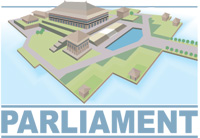Columns
Might-is-Right ‘Yahapalana’ Govt. bypasses Supreme Court, voters’ FR
It is not unusual for any govt with a two-third majority in Parliament, to trespass on Constitutional provisions meant to safeguard the Fundamental Rights (FR) of the people and keep the Legislature in check. On Thursday (21), in Parliament, there was a classic example of this when the ‘Yahapalana’ Govt. decided that “might is right”, and used its large majority in Parliament to push through an Amendment to the Provincial Councils (PC) Elections Act, which helps it postpone elections to several PCs. This was two days after the Supreme Court, in a majority decision, shot down the 20th Amendment to the Constitution, which the Govt had set for debate on Wednesday. The Amendment would have helped extend the term of at least three PCs, the five-year term of which are set to lapse within the next two weeks, and also helped curtail the terms of the six other PCs, the terms of which end in 2018 and 2019.
The SC, by a 2-1 ruling said, “Advancing the election date will not violate the Constitution, as it will not deprive the voter of his franchise, as he will be able to exercise his vote in advance or, before the expiry of the date. On the other hand, the delay in exercising the franchise will affect the FR of the voters.”
Hence, the Govt decision to push through the PC Elections Amendment Bill, in spite of the SC determining that the voters’ FR would be affected by delaying the franchise, does not look good, despite its effects to justify the move, by saying the decision to postpone the polls is to get the new electoral system in place, as well as hold elections to all PCs on one day.
During the debate on the Bill, Prime Minister Ranil Wickremesinghe assured the House that the elections to both local authorities and the PCs would be held by March 30, next year. “It was our intention to hold elections on a single date for all PCs. Yet, we had to change that decision following a ruling by the SC, but we will hold elections as soon as possible,” he said.
While the Govt managed the two-third majority, which the Attorney General (AG) had decided some clauses of the Bill needed to get Parliamentary approval, members of the Joint Opposition (JO) group argued that the Bill could not be taken up for debate unless it was referred to the PCs for their approval. However, Speaker Karu Jayasuriya announced that the AG had informed him that the Bill does not need such referral to the PCs, and it was amidst strong protests from JO MPs that the Bill was passed.
In this instance, the argument by the JO was legitimate, as the Bill before the House was to make it mandatory for political parties to field at least 30% female candidates to contest in PC polls, while the provision to delay the polls came by way of amendments to this Bill. While the 19th Amendment to the Constitution did away with the provision which allowed for the introduction of “Urgent Bills” to the House, thus allowing the public to challenge all Bills tabled in the House for their Constitutionality before the SC, introducing far reaching amendments after this process has been exhausted, takes away from the spirit with which the provisions were put in place. The Inland Revenue Act which was approved by Parliament earlier this month, saw the introduction of nearly 200 amendments to it during the Committee Stage debate of the Bill. This was after the SC had given its go ahead to the Bill that had been tabled in the House with a few alternations, but the one that was passed by Parliament finally, was heavily altered and not seen by the SC.
The same was the case with the PC Elections (Amendment) Bill where there were significant changes to the Bill that was tabled in the House, from the one that was approved by the House on Wednesday. In a country where there is no provision for the judicial review of legislation, a thorough scrutiny of Bills is essential, prior to their approval by the House. Once the die is cast, the people of this country are bound by that law, until and unless Parliament decides it wants the law repealed, replaced or amended.
While the PC Election is a done deed by now, the ‘Yahapalana’ Govt will have to face its first electoral tests since August 2015 General Election within the early half of next year. While in comparison to the manner in which the former regime perverted the entire legislative process to fulfill personal agendas, such as by way of the 18th Amendment to the Constitution, this Govt, no doubt, looks better but, trying to bypass Constitutional safeguards that ensure the FR of the people will not go down well for it. After all it was public frustration with the abuse of power by the regime of former President Mahinda Rajapaksa that made people vote him out of office. If the ‘Yahapalana’ Govt decides to take the same route, come election time, it would be “yesterday once more”.


Leave a Reply
Post Comment